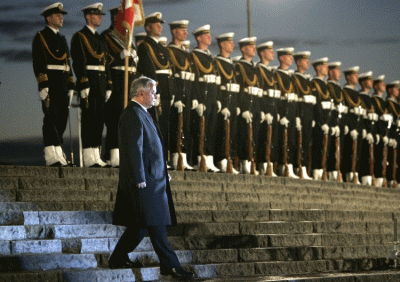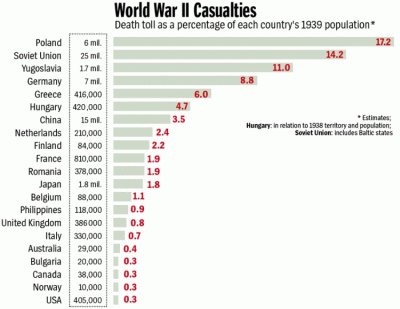
With
a face perhaps reflecting contrition, German Chancellor Merkel
lays
a candle after giving a speech [watch below] at a ceremony in
Poland
on the 70th anniversary of the outbreak of WW II. She said,
'We
caused unending suffering in the world. I bow before the victims.'
NRC Handelsblad,
The Netherlands
On 70th Anniversary of WW II, Wounds in Europe Still Sting
"In
the West, the arrival of the Americans symbolized the restoration of democracy
and the rule of law. In the East, the march of the Soviet Army is viewed as the
beginning of a second and much more prolonged occupation. Russian public
opinion is offended by these views."
EDITORIAL
Translated By Meta
Mertens
September 2, 2009
The
Netherlands - NRC Handelsblad - Original Article (Dutch)
Seventy years later, the war continues
to provoke political disputes. The service to commemorate the beginning of the
war on September 1, 1939 in Gdansk was dignified in itself. But elsewhere,
history was being liberally interpreted. Polish President Kaczynski gave a
speech in which he compared the murder of more than 20,000 Polish officers by
the Stalinist NKVD [the massacre
at Katyn] with the murder of six million Jews by the Nazis. The public
relations section of the Russian SVR,
its foreign intelligence branch, used the historic date to present a book titled
Secrets of Polish Politics, 1935-1945.
According to Major General Sotskov, documents in the book prove that in the
thirties, Poles wanted to fuel separatism in the Ukraine, the Caucuses and even
Central Asia with something called operation "Prometheus."
Were these submissions meant only
to bring new interpretations of the facts to the surface? No. The subtext of Kaczynski’s interpretation
was: Stalin was just as much a criminal as Hitler - and that this is a
reflection on Putin. And Sotskov's subtext: Poles were and remain cunning
fascists.
Posted
by WORLDMEETS.US
Obviously, Europeans are far
from a basic historic consensus. The reason is clear. In the West, the 1945 victory
of the allies was experienced as a liberation. The arrival of the Americans in
particular symbolized the restoration of democracy and the rule of law. In the
East, the march of the Soviet Army is viewed as the beginning of a second and
much more prolonged occupation - this time by the Russians and communists. This
interpretation leaves no room for the fact that between 1941 and 1945, the
Soviet Union was an ally of America and England and during those years, perhaps
25 million Soviet citizens were killed. Conversely, Russian public opinion is
offended by these views. Russia sees itself as a nation of victims and
especially heroes.

At
a ceremony in Gdansk, Poland to commemorate the 70th anniversary
of
WWII - which began with a Nazi attack on Poland - President Kaczynski
of
Poland described the Russian invasion of Poland that followed the Nazi
one,
as a 'stab in the back.'
[Watch
video by clicking here or clicking on the photo above.]
Disdain for this kind of
historical patriotism is inappropriate. In The Netherlands, tempers heat up when
the slave trade and Srebrenica is a topic of conversation [Dutch peacekeepers
failed to protect Bosnians from a Serb onslaught]. But it's past time for us to
be less opportunistic about interpreting history. Thanks to the fall of the
Berlin Wall, all nations in Europe have been independent for two decades. This
makes detachment more possible. In post-war Germany, the Vergangenheitsbewältigung
[the struggle to come to terms with the past] really only began twenty years
ago, and a minor dispute among historians burst onto the scene in the
mid-eighties.

SEE ALSO ON THIS:
Izvestia, Russia:
Truman and Churchill No Better Than Stalin
Vedemosti, Russia:
Soviet Theft of American Nuclear Secrets Was Fully Justified
Der Spiegel, Germany:
Why Wasn't Hitler Stopped?
Der Spiegel, Germany:
German Editorial
Roundup on 70 Years After WW II
The Telegraph, U.K.:
Vatican Says
U.S. and Britain Knew of Nazi
Murder of Jews and Did Nothing
The Times:
Does Appeasement Look
So Bad, 70 Years Later?

But before detachment can
happen, politicians will have to stop using history to fight current conflicts.
Prime Minister Putin, who wrote a reasonably balanced article in Polish
newspaper Gazeta Wyborcza, said it simply but effectively: “History is
complicated. I believe that it is first and a matter for specialists.” And
therefore not for politicians who must practically confront the present than an
unknowable past.
CLICK HERE FOR
DUTCH VERSION
[Posted
by WORLDMEETS.US September 3, 3:52pm]